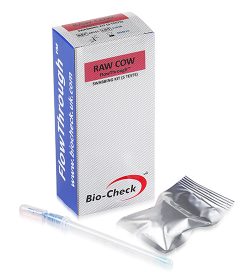How do you mitigate the risk of species contamination
occurring in the supply chain and in production?
 Food fraud has been with us for centuries, and there is no reason to think that it will ever be completely eliminated as a food safety concern.
Food fraud has been with us for centuries, and there is no reason to think that it will ever be completely eliminated as a food safety concern.
Targets for adulteration include commonly used commodities like wine, olive oil, and tea. Spices can be especially vulnerable to adulteration, and their prices make fraud a lucrative activity.
Meat is another commodity that is a target for food fraud. Take the not-so-humble hamburger, with its long and sometimes whimsical history. A common and desirable ingredient, ground beef is especially susceptible to financially motivated adulteration.
“In a 20-year analysis of reported food fraud in the beef supply chain, researchers have found counterfeiting to be the most common type of fraud. “By better understanding the fraud which is taking place, we can target fraud prevention, detection, and mitigation,” Kelsey Robson from Queen’s University Belfast tells FoodNavigator.” Read the article
More often than not, adulteration of this particular commodity takes the form of blending cheaper meats, especially pork, into the mix.
In January 2013, Irish authorities discovered horsemeat in burgers that were supposed to contain 100% beef. Since beef and horsemeat have much the same texture and taste, it took quite a while before the extent of the adulteration was discovered: contaminated beef products were found all across Europe. Historically, it has been unusual for food manufacturers and regulatory authorities to test foods for materials such as horse meat that are not expected to be present.
Dietary Restrictions
Religious concerns drive consumer demand for halal and kosher certifications. Related specification testing for meat and meat products is warranted, especially impactful when pork and pork products are incorporated into beef or lamb products for nefarious purposes.
Species adulteration in raw meat is a two-fold concern:
1) food fraud and 2) impact on certain social groups with dietary restrictions.
Compliance and Food Safety
Quality is the focal point of compliance with government rules on labeling and inspections. Beef products can have varying proportions of fat to meat, but to be compliant with labeling guidelines all of those components will be beef. A company cannot substitute fat from other sources without explicitly labeling it as such.
The USDA FAQ for Ground Beef Food Safety
USDA’s Consumer Guidelines for Ground Beef and Food Safety
FlowThrough™ Raw Meat Speciation on-site test kits
Emport is pleased to offer a solution for testing your meat products to make sure that they comply with your product specifications. As an early warning device, these easy kits are a great complement to your existing quality assurance program, verifying that meat species controls are working.Want assurance that your product will meet its ingredient specifications? Flowthrough™ offers stricter process controls to minimize the potential for cross-contamination, whether intentional or accidental. As with all of your quality assurance efforts, this added step enhances brand reputation, raising consumer confidence and trust in labeling information. Kits are available for cow, horse, pig, sheep and poultry
Looking for validation/verification on your cleaning SOP? No matter what protocol you are following, validation and verification of your sanitation plan is key. Surface testing can demonstrate compliance and provide assurance. Flowthrough™ kits for detecting meat residue on surfaces are available for cow, pig, sheep and poultry.

FlowThrough™ Key Attributes
- Easy to use, no special training required
- Includes all materials for conducting five tests
- Reliable, sensitive detection
- Results in < 8 minutes for surfaces, < 15 minutes for foods
- No ‘overload’ risk if high levels of contamination in foods.
Is FlowThrough™ the right test for you?
Quality and hazard plans can be as unique as the product you’re creating. We’ve outlined the basic information about these speciation kits in the article and in our general information page. Questions? We’re happy to discuss the Flowthrough™ tests with you and provide additional information.



